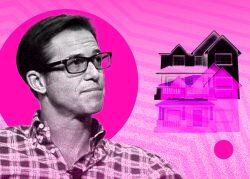The red lights were flashing all summer long — if you knew where to look.
Homebuyers took to Twitter to complain that Zillow’s much-vaunted estimates were wildly out of sync with market prices. Sellers were just as eager to crow about how much the Seattle-based company agreed to pay over asking prices. It was a big problem for a company that had bet its financial future on a computer algorithm to let it quickly buy and sell homes at a profit.
Zillow is really out here saying my house is worth $20K more than it was a month ago. Market is straight up bananas
— MSgt Turkey Time (@SgtRando) June 26, 2021
Two months later, @DrSCubed chimed in:
My girlfriend just lost a $40k over asking price (12% over asking) with 50% down, no contingencies, & willing to close in 7 days and didn’t even get a counter offer.
Since learned buyer was Zillow.
— Saucy Stacey but, like, Meta (@DrSCubed) August 24, 2021
And in September, it was the turn of @YourComicMuse:
Just want to say I RT Zillow tweets, b/c it happened to me on a tiny condo. I had a top rate conventional loan. 40% down. Letter of recommendation from my lender. Perfect credit. Offered $5,000 over asking.
Zillow came in- All cash. $10,000 over ask. Waived rights to inspection.— Your Comic Muse (@YourComicMuse) September 26, 2021
Last month, @philparkbot related another personal tale:
My wife and I have been house hunting since February in an insane market. She noticed a home that was listed for sale 2 months ago, sale completed a month later, and now it’s listed again. The owner of the property? @zillow. They bought it for $60k over asking.
There’s more. pic.twitter.com/z10nG7mEuF
— Meta Park (@philparkbot) October 31, 2021
That tweet went up on Halloween. Zillow shut down the homebuying business two days later and its shares lost a fifth of their value today alone.
It’s by no means unusual that dissatisfied consumers turn to social media, in many cases banding together to bring about change on a practical or political level. And it’s not hard to push conspiracy theories that include Zillow plotting to artificially send home prices higher for its own purposes. Yet iBuying hardly has a national platform big enough to accomplish that goal. What stands out is that so many people had been pointing out for so many months that it didn’t have a handle on pricing — and yet the company held fast.
The end, when it came, took less than a month. On Oct. 18, the company said it would “pause” Zillow Offers, which it had acquired almost 10,000 homes in the third quarter alone. Then, on Monday, Zillow said it wanted to unload about 7,000 homes, seeking almost $2.8 billion. A day later came the final blow: It scrapped the business entirely and said a quarter of its staff would lose their jobs.
The official reason: It was just too hard to forecast home prices three to six months in advance.
“Put simply, our observed error rate has been far more volatile than we ever expected possible, and makes us look far more like a leveraged housing trader than the market-maker we set out to be,” CEO Rich Barton said on an earnings call on Tuesday.
The heart of Zillow’s mistake was a controversial, though well relied-upon method for forecasting prices known as the Zestimate, an automated property valuation tool. The company says Zestimate’s median margin for error nationally is 1.9 percent for listed homes and 6.9 percent for those that aren’t listed. Properties that receive a Zillow Offer are by definition off-market as they have not yet been publicly listed.
Zillow insists that the Zestimate is “a starting point.” Spokesman Viet Shelton said in an email that the company remains “confident” in its accuracy and that “we continue to improve it every day.”
Consumers disagree.
Yup. My landlord, who I actually really like and is good to us, has decided to raise our rent. I wanted to throw up and cry when she said “Zillow is a good reference” as to why she’s raising our rent?? pic.twitter.com/AItJXdbA55
— Amber☠️ (@amber_alert1432) November 3, 2021
Relying solely on one’s own valuation tools is a red flag, said Ralph McLaughlin, chief economist at real estate data and analytics company Kukun.
“It’s kind of like drinking your own Kool-Aid,” he said. “You do want to keep that process at arm’s length and it doesn’t seem like Zillow did that.”
The end of Zillow Offers was a bitter pill for Barton, who founded the company in 2005 with Spencer Rascoff and Lloyd Frink. Barton served as CEO until stepping down in 2010. He returned to the C-suite in February of 2019 after serving as executive chairman, replacing Rascoff in the top role and quickly began a pivot into iBuying, the catchy term for algorithmically driven instant-homebuying.
At the time, the move made sense. Zillow said it was getting requests for an offer every five minutes. By as soon as 2022 at the earliest or at least by 2024, it would be buying 5,000 homes a month and the unit would be reaping $20 billion of revenue a year. With Barton at the helm, investors and analysts lauded the wager.
“I have a certain penchant for and attraction to big swings,” Barton said.
And competitors were already a step ahead. A few months after he was installed as CEO, Barton told The Information that OpenDoor represented an “existential threat.” He likened the shift to the decision by Netflix, where he was a board member, to produce its own content — freeing the company from drilling its own oil wells.
“If it works and we don’t do it, we get displaced as the marketplace,” he said.
It didn’t. Zillow recorded a $304 million writedown on its almost 10,000 homes in the third quarter after “unintentionally purchasing homes at higher prices than our current estimates of future selling prices.” It expects to write down another $265 million in the fourth quarter on top of $230 million to close the unit.
Instead of the billions of dollars Zillow expected to earn, it ended up losing $328 million in the third quarter alone. It’s still in contract to buy another 8,000 homes. And Zillow bulls took a bath: the stock lost more than half its value since peaking in February — during one of the nation’s biggest surge in home prices. As the shares plummeted today, about 62 million changed hands — more than 15 times the daily average volume.
Some investors were undeterred. Cathie Wood’s Ark Investment Management, which holds a 5.5 percent stake in Zillow, bought 288,813 shares through her flagship exchange-traded fund on Wednesday, according to Bloomberg. Ark didn’t respond to a request for comment. Other major Zillow holders, including Vanguard which owns 6.6 percent stake, JPMorgan Chase which owns 5.8 percent stake, and Baillie Gifford with a 4.6 percent stake, declined to comment.
While analyst Jason Helfstein at Oppenheimer didn’t cut his “perform” rating for Zillow, he said in a note on Wednesday that management must “focus on the next iteration of agent products,” something that will take a while. “The majority of Zillow’s revenue is now tied to the real estate cycle, and therefore should not trade at a secular growth multiple,” he wrote.
What’s next for Zillow? A return to the status quo. The company will “focus on the broader problem — helping people move,” Barton said on yesterday’s call.
If there are winners, it’s those who profited from Zillow’s mistakes.
I spoke to 2 local investors this weekend, 1 in AZ, another in OH, who were buying 100s of homes from homeowners, then selling them to Zillow and Opendoor for $50K – $100K with no improvements…Both made millions.
— Jay Bourgana (@JayBourgana) November 3, 2021
Read more



